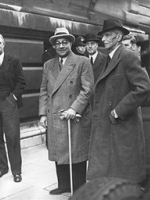Ahmad, Ziauddin (ed.), Quaid-i-Millat Liaquat Ali Khan: Leader and Statesman (Karachi: the Oriental Academy, 1970)
Ahmad, Ziauddin, Shaheed-e-Millat Liaquat Ali Khan: Builder of Pakistan (Karachi: Royal Book Company, 1990)
Akhtar, Jamna Das, Political Conspiracies in Pakistan: Liaquat Ali's Murder to Ayub Khan's Exit (Delhi: Punjabi Pustak Bhandar, 1969)
Allana, G., 'Nawabzada Liaquat Ali Khan', in Our Freedom Fighters, 1562-1947: Twenty-One Great Lives (Karachi: Paradise Subscription Agency, 1969), pp. 281-94.
Amin, Shahid M., Pakistan's Foreign Policy: A Reappraisal (Oxford: Oxford University Press, 2000)
Chattopadhyay, Raghabendra, Indian National Congress and the Indian Bourgeoisie: Liaquat Ali Khan's Budget of 1947-48 (Calcutta: Centre for Studies in Social Sciences, 1986)
Fazeel, Ali Ahmed, 'With Pakistan's First Prime Minister', Sun, Karachi, 16 October 1975
Jinnah, Mahomed Ali, Gandhi, Mahatma, and Rajagopalachari, C., Jinnah-Gandhi Talks, September, 1944: Text of Correspondence and Other Relevant Documents, foreword by Liaquat Ali Khan (Delhi: Central Office, All India Muslim League, 1944)
Kazmi, Muhammad Raza, Liaquat Ali Khan: His Life and Work (Karachi: Pakistan Study Centre, University of Karachi, 1997)
Khan, Liaquat Ali, Long, Roger D., and Wolpert, Stanley, 'Dear Mr Jinnah': Selected Correspondence and Speeches of Liaquat Ali Khan, 1937-1947 (Oxford: Oxford University Press, 2004)
Kha, Sardar Amir Azam, 'Quaid-i-Millat', Pakistan Standard, Karachi, 16 October 1955
Liaquat Ali Khan, Ra'ana, and Douglas, F. D., Challenge and Change: Speeches (Karachi: All Pakistan Women's Association, 1979)
Masroor, Mehr Nigar, Ra'ana Liaquat Ali Khan: A Biography (Karachi: All Pakistan Woman's Association, 1980)
Miles, Kay, Liaquat: The Man of Destiny (Karachi: All Pakistan Women's Association, c. 1953)
Omar, Kaleem, 'The American Press on Liaquat', The News, 22 October 2000
Pakistan, Pakistan Today: A Souvenir of the Visit to the United States of America of the Honourable Mr. Liaquat Ali Khan, Prime Minister of Pakistan, and Begum Liaquat Ali Khan, May, 1950 (Washington, D.C., 1950) .
Shushtari, Zayn Al-Abidin, Fath-ul-Mujahideen: A Treatise on the Rules and Regulations of Tipu Sultan's Army and His Principles of Strategy, with a foreword by Liaquat Ali Khan (Karachi: Urdu Academy Sind, 1950)
